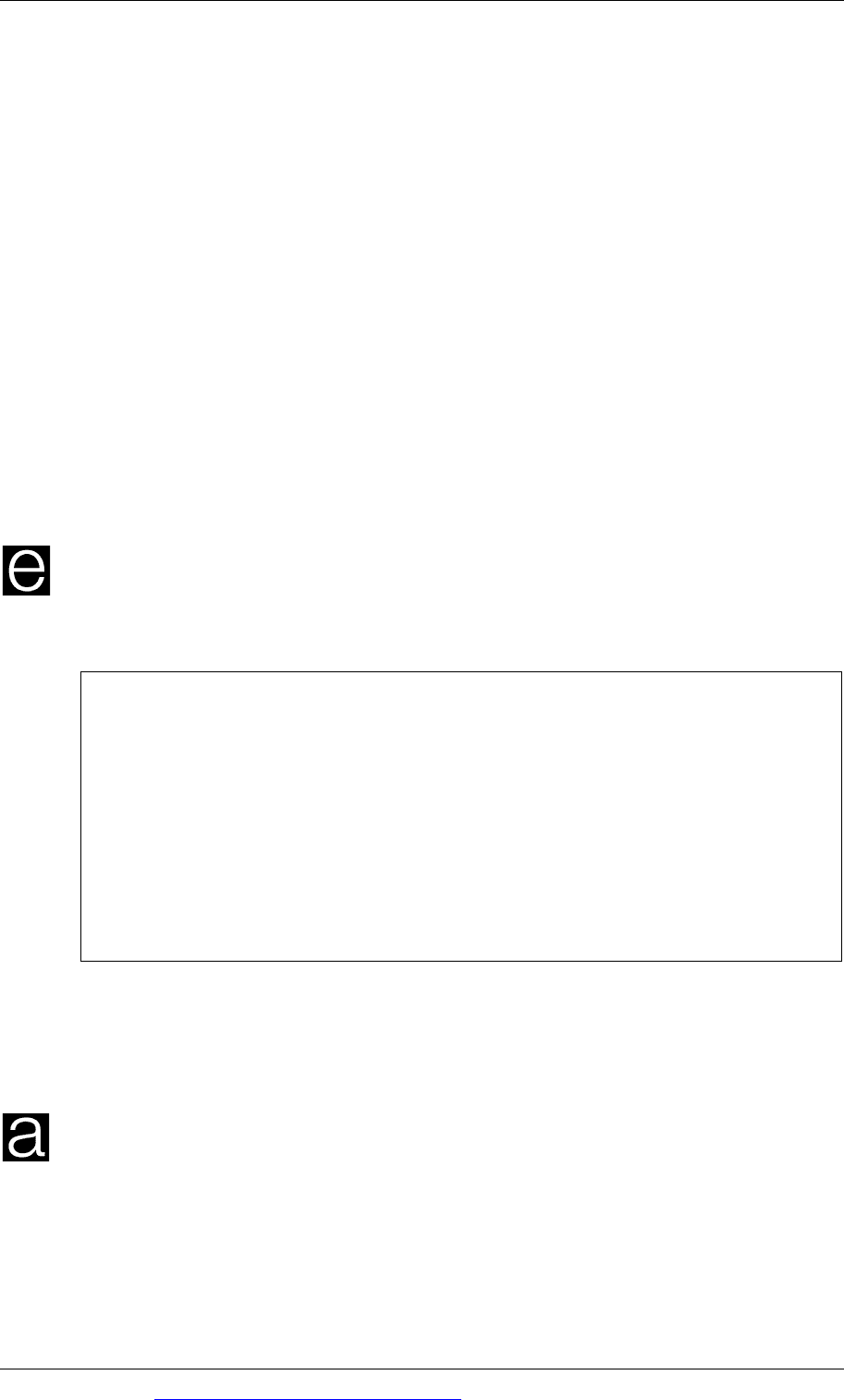ACCA F8 (INT) Audit & Assurance - 2010 - Study text - Emile Woolf Publishing
Подождите немного. Документ загружается.


Chapter 16: The external audit report
© EWP Go to www.emilewoolfpublishing.com for Q/As, Notes & Study Guides 355
If the auditor is still satisfied that management is incorrect in their opinion, he
should meet with the management and:
Discuss their reasons for not depreciating the asset
Obtain a representation from them confirming that the asset will not be
depreciated
Decide whether the effect of this action by management on the financial
statements is material or ‘material and pervasive’ and so what form of modified
audit report is necessary
Warn management that the audit report will be modified unless management
change their view
If management still refuse to change their view, issue a modified audit opinion,
which will be either a qualified opinion or an adverse opinion.
3.9 Audit reports and the exam
For the exam, you may be expected to study an audit report that contains errors and
identify and explain what those errors are. Here is an example.
Example
The audit junior of Errata Co has drafted the audit report for the year ended
31st December 20X4. The following are extracts from that report.
AUDITOR’SREPORT
We have audited the accompanying financial statements of ErrataCo.
Management have failed to provide against a material receivable in the financial
statements.
Without qualifying our opinion, we draw attention to the above fact.
In our opinion, the financial statements give a true and fair view of the financial
position of Errata Co as of 31 December 20X4, and of its financial performance
and its cash flows for the year then ended in accordance with International
Financial Reporting Standards.
Required
Set out the errors in the above report and explain why they are errors. Note: You are
not required to refer to the paragraphs not reproduced above.
Answer
(1) The report is headed ‘Auditor’s Report’. It should be headed ‘Independent
Auditor’s Report’ to distinguish it from reports by other auditors which might
not be independent.
(2) The report does not set out which financial statements have been audited. It
should refer to the year end and the specific statements audited (for example
statement of comprehensive income, statement of financial position, statement

Paper F8: Audit and assurance (International)
356 Go to www.emilewoolfpublishing.com for Q/As, Notes & Study Guides © EWP
of cash flows and notes to the financial statements) to ensure there is no
misunderstanding about exactly what has been audited (for example, not the
directors’ report).
(3) The amount of the error should be quantified (e.g. the receivable is stated at
$400,000 and should have been included at $nil).
(4) The report contains an emphasis of matter paragraph and then an unmodified
opinion. The report should have been modified on the basis of a material but
not pervasive misstatement and a qualified (‘except for’) opinion given.

Chapter 16: The external audit report
© EWP Go to www.emilewoolfpublishing.com for Q/As, Notes & Study Guides 357
The impact of going concern on the audit report: ISA 570
Where the use of the going concern assumption is appropriate but a material
uncertainty exists
Where the use of the going concern assumption is inappropriate
4 The impact of going concern on the audit report:
ISA 570
As discussed in a previous chapter, if indications are found which suggest that the
going concern basis might not be appropriate for preparing the financial statements,
the auditor is required by ISA 570 to consider the implications for his audit report.
The form of the report will depend on the auditor’s judgement. There are two
possible views he could take:
the use of the going concern assumption is appropriate but a material uncertainty
exists, or
the use of the going concern assumption is inappropriate.
If management is unwilling to make or extend its assessment the auditor is also
required to consider the implications of this for his audit report.
4.1 Where the use of the going concern assumption is appropriate but a
material uncertainty exists
Where the auditor considers that the going concern assumption is appropriate, but
a material uncertainty exists, he must consider whether the financial statements:
adequately describe the principal events or conditions that may cast significant
doubt on the entity’s ability to continue as a going concern and management’s
plans to deal with those events or conditions, and
disclose clearly that there is a material uncertainty related to events or conditions
that may cast significant doubt on the entity’s ability to continue as a going
concern .
If there is adequate disclosure, then the auditor should express an unmodified
opinion. However, he should use an emphasis of matter paragraph to:
highlight the uncertainty, and to
draw attention to the relevant note in the financial statements.
If there is not adequate disclosure then the auditor should express a qualified or
adverse opinion.

Paper F8: Audit and assurance (International)
358 Go to www.emilewoolfpublishing.com for Q/As, Notes & Study Guides © EWP
4.2 Where the use of the going concern assumption is inappropriate
Where the financial statements have been prepared on the going concern basis, but
the auditor considers the going concern assumption to be inappropriate, the auditor
should express an adverse opinion.
The auditor may give an unmodified opinion if the financial statements have been
prepared on an alternative acceptable basis (for example, a break-up basis) and
there is adequate disclosure of this basis. An emphasis of matter paragraph may be
required in the audit report.

Chapter 16: The external audit report
© EWP Go to www.emilewoolfpublishing.com for Q/As, Notes & Study Guides 359
Other information issued with the audited financial statements:
ISA 720
Purpose of ISA 720
Material inconsistencies
Material misstatements of fact
5 Other information issued with the audited financial
statements: ISA 720
5.1 Purpose of ISA 720
Although the auditor reports only on the financial statements themselves, the
financial statements are issued with other, unaudited, information. The nature of
this additional unaudited information may vary according to national
requirements and individual companies. However, it may include items such as a
chairman’s report, financial highlights or employment data.
In order that the credibility of the financial statements is not undermined by any
of this additional information, ISA 720 The auditor’s responsibility in relation to other
information in documents containing audited financial statements imposes certain
duties on the auditor.
The objective of the auditor in respect of ISA 720 is to respond appropriately
when documents containing audited financial statements and the auditor’s report
include information that could undermine their credibility.
5.2 Material inconsistencies
ISA 720 requires the auditor to read the other (unaudited) information in order to
identify material inconsistencies with the audited financial statements.
An inconsistency exists when the other information contradicts information
contained in the audited financial statements.
Where a material inconsistency is identified prior to the date of the auditor’s report,
the auditor will need to decide what should be amended; the audited financial
statements, or the other unaudited information. ISA 720 then requires the following.
If the auditor judges that financial statements need to be revised, and
management refuse to do so, then the auditor should qualify his audit opinion.
If the auditor judges that the other information needs to be revised, and
management refuse to do so, then the auditor should:
− include an emphasis of matter paragraph in his audit report, or
− withhold his audit report, or
− where allowed by law, withdraw from the audit.

Paper F8: Audit and assurance (International)
360 Go to www.emilewoolfpublishing.com for Q/As, Notes & Study Guides © EWP
If a material inconsistency is identified after the date of the auditor’s report the
auditor should follow the provisions of ISA 560 Subsequent events.
5.3 Material misstatements of fact
A material misstatement of fact exists when unaudited information is incorrectly
stated or presented, but the information is not related to matters appearing in the
audited financial statements. (The misstatement of fact therefore does not
contradict the financial statements.)
If the auditor becomes aware of an apparent material misstatement of fact, ISA 720
requires him to:
discuss the matter with management, and
if he considers that there is an apparent material misstatement of fact, request
management to take legal advice, and
consider the legal advice received by the entity
If the auditor concludes that there is a material misstatement of fact which
management refuses to correct he is required to:
notify those charged with governance, and
take any further appropriate action (such as taking legal advice about the matter).

© EWP Go to www.emilewoolfpublishing.com for Q/As, Notes & Study Guides 361
Paper F8 (INT)
Audit and assurance
CHAPTER
17
Other audit and assurance
situations and reports
Contents
1 The International Framework for Assurance
Engagements and available guidance
2 Not-for-profit organisations (NFPOs)
3 Communicating with those charged with
governance: ISA 260
4 Communicating deficiencies in internal control:
ISA 265
5 The audit of smaller entities
Tutorial note
This final chapter deals with a number of syllabus topics
each of which has its own particular characteristics.

Paper F8: Audit and assurance (International)
362 Go to www.emilewoolfpublishing.com for Q/As, Notes & Study Guides © EWP
The International Framework for Assurance Engagements and
available guidance
The International Framework for Assurance Assignments
International Standard on Assurance Engagements (ISAE) 3000
International Standard on Review Engagements (ISRE) 2400
1 The International Framework for Assurance
Assignments and available guidance
1.1 The International Framework for Assurance Engagements
The International Framework for Assurance Engagements is a series of
pronouncements that came into effect on 1st January 2005.
The Framework makes a distinction between:
audits and reviews of historical financial information (regulated by ISAs and
ISREs), and
assurance engagements other than audits and reviews of historical financial
information. These engagements are regulated by International Standards on
Assurance Engagements (ISAEs).
At Paper F8 you are required to have knowledge of just two ISREs and ISAEs: ISRE
2400 and ISAE 3000. These are covered below.
The Framework also makes a distinction between:
assurance assignments that give a reasonable level of assurance, and
assurance assignments that give a limited level of assurance.
In assurance engagements it is never possible to give an absolute level of assurance
as a result of:
the lack of precision often associated with the subject matter
the nature of the evidence available
the timescale involved.
Reasonable level of assurance
Where a reasonable level of assurance is given, the risk attached to the assignment is
at a sufficiently low level to enable to the practitioner to give positive assurance.
Reasonable assurance can only be given in the following circumstances:
the subject matter of the assurance service engagement is the responsibility of
another party, and

Chapter 17: Other audit and assurance situations and reports
© EWP Go to www.emilewoolfpublishing.com for Q/As, Notes & Study Guides 363
the subject matter is identifiable and can be subjected to evidence-gathering
techniques.
In other words, a reasonable level of assurance can be given only if the accountant is
carrying out an assignment that looks at information that has not been prepared by
the accountant (or relates to some other subject matter that is not the responsibility
of the accountant). In addition, the accountant must be able to obtain sufficient
evidence for giving a positive opinion.
A statutory audit is therefore an example of an assignment which gives reasonable
assurance.
Limited level of assurance
Where only a limited level of assurance is given:
the risk is higher than that for an engagement where the accountant is able to
give a reasonable assurance, but
the risk is sufficiently low to allow for a ‘negative’ expression of the accountant’s
conclusions (a negative opinion, as in a review report).
ISRE 2400 below, looks at this type of report.
1.2 International Standard on Assurance Engagements (ISAE) 3000
ISAE 3000 Assurance engagements other than audits and reviews of historical financial
information sets out basic principles, key procedures and guidance for professional
accountants (referred to as ‘practitioners’) when carrying out relevant assurance
engagements.
Key general points from ISAE 3000 are set out below.
Ethical requirements. The IFAC ethical code should be followed.
Quality control. Appropriate procedures for quality control of the accountant’s
work should be applied to each engagement.
The engagement should be planned and performed with a degree of
professional scepticism, recognising that the subject matter of the engagement
may be materially misstated.
Before completion of an assurance engagement, the client may ask for the nature
of the engagement to be changed to a ‘non-assurance’ engagement, or for the
level of assurance to be reduced. If this happens, the practitioner should
consider whether the request appropriate, and should not agree to the change
unless there is a good reason.

Paper F8: Audit and assurance (International)
364 Go to www.emilewoolfpublishing.com for Q/As, Notes & Study Guides © EWP
1.3 International Standard on Review Engagements (ISRE) 2400
Objectives of ISRE 2400
ISRE 2400 Engagements to review financial information sets out the objective of a
review of financial statements as:
‘…to enable an auditor to state whether, on the basis of procedures which do not
provide all the evidence that would be required in an audit, anything has come to
the auditor’s attention that causes the auditor to believe that the financial statements
are not prepared, in all material respects, in accordance with an identified financial
reporting framework.’
Note that a review:
requires less evidence than an audit, and
has an opinion that is expressed in negative terms: (as discussed above, it gives
‘negative assurance’).
Because a review engagement provides a lesser form of assurance than an audit, the
work for the review will usually be limited to analytical and other review
procedures. Detailed verification work (for example, substantive tests) will not
usually be carried out. This will usually mean that fewer assurance staff, but more
experienced staff, will be required for a review engagement than for an audit.
Principles to apply to review engagements
ISRE 2400 set outs the following general principles that should be applied to a review
engagement. The accountant should:
comply with relevant codes of ethics
plan and perform the work with an attitude of professional scepticism,
recognising that material misstatements may exist in the information that is
subject to review
obtain sufficient and appropriate evidence, primarily through enquiry and
analytical procedures.
The actual terms of a review engagement should be agreed with the client, and set
out in an engagement letter.
Procedures for a review of financial statements
Procedures for the review of financial statements will usually include the following:
The accountant should obtain an understanding of the entity’s business and the
industry in which it operates.
The accountant should make enquiries into:
− the entity’s accounting policies, practices and procedures, including the
preparation of financial statements
− material assertions in the financial statements that are subject to the review
